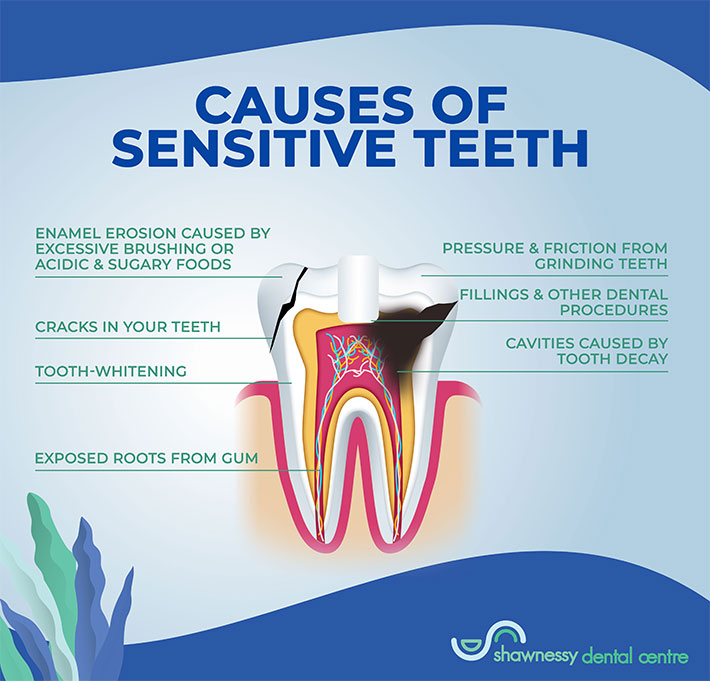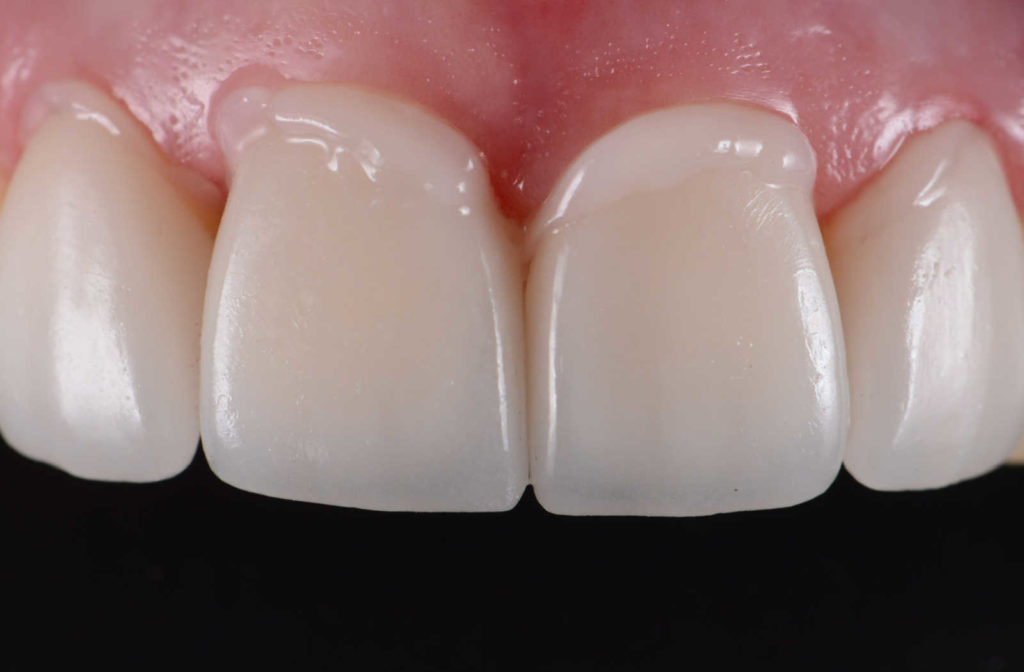Sensitivity can be a sign of changes to your teeth and your dental health. Finding out not only why your teeth feel sensitive but also how you can treat tooth sensitivity can help you get relief and prevent tooth sensitivity in the future.
Tooth sensitivity can grow gradually or appear suddenly. The causes of tooth sensitivity include enamel erosion, tooth decay, gum disease, cracked teeth, and some dental procedures.
It’s important to talk to your dentist if you have tooth sensitivity that comes on suddenly or lasts for a long time, as sensitive teeth may be a warning for other dental health conditions. During a dental exam, your dentist can help you understand what may be making your teeth sensitive and which treatments can help you get relief.

What Causes Tooth Sensitivity?
There are several oral health conditions that can lead to tooth sensitivity. Understanding the specific causes of sensitive teeth can help you know when to speak with your dentist and how to avoid tooth sensitivity in the future.
Some of the common causes of sensitive teeth include:
Enamel Erosion
Over time, the outer layer of your teeth—your enamel—can wear down and expose the dentin underneath, leading to a condition called dentin hypersensitivity. When your dentin is exposed, the food you eat can stimulate the nerves inside your teeth, causing sensitivity and discomfort.
Foods that can trigger tooth sensitivity include:
- Hot and cold food
- Acidic food
- Sticky food
- Sugary food
About 12% of people experience dentin hypersensitivity during their life. Fortunately, there are treatment options for enamel erosion and dentin hypersensitivity that can help reduce discomfort. Talking to your dentist can help you determine the right solution for your dental needs.
Tooth Decay
Cavities caused by tooth decay are another possible cause of tooth sensitivity. The bacteria that cause tooth decay can eat away at your enamel and expose the dentin underneath.
As cavities grow deeper into your teeth, they can cause more severe toothaches and infections. If tooth decay isn’t prevented with dental hygiene and regular dental exams, you may require fillings or other types of restorative dental care.
Gum Recession
Gum recession occurs when the gum tissue around a tooth begins to pull back, exposing the roots of teeth below your gum line. There are several potential causes of receding gums, including periodontal disease (gum disease), excessive brushing, and aging.
Gum recession can lead to tooth sensitivity because the exposed lower areas of your teeth are not protected by enamel or cementum (a protective layer covering the root). As a result, hot, cold, sweet, or acidic foods and drinks can trigger nerve pain. Gum recession can also increase your risk of tooth decay and tooth loss if left untreated.
Cracked Teeth
Cracked teeth and crowns can cause tooth sensitivity because they can expose the inner layers of your teeth. When the cracks are deep enough, they can allow hot or cold temperatures to reach your nerves, causing discomfort. Biting down on food can also make cracked teeth worse and trigger discomfort.
If left untreated, cracked teeth can lead to infection and tooth loss, so it’s important to consult a dentist if you experience any symptoms of cracked teeth, such as pain while biting or sensitivity to hot and cold temperatures.
Grinding Your Teeth
Grinding your teeth, also known as bruxism, can cause tooth sensitivity. When you grind your teeth, the constant pressure and friction can wear away your enamel, exposing the sensitive dentin layer underneath.
Over time, bruxism can also lead to other dental problems, such as cracked or chipped teeth, jaw pain, and headaches. It is important to see a dentist if you suspect you are grinding your teeth in order to prevent further damage and protect your oral health.
Dental Procedures
Some dental procedures can cause temporary tooth sensitivity. Fillings can cause sensitivity that may last for up to 2 weeks. Some teeth whitening procedures and products may also cause temporary sensitivity.
If you have concerns about possible sensitivity following a dental procedure, your dentist can answer your questions and provide advice on managing sensitivity while still enjoying the benefits that dental procedures can provide for your dental health and smile.

How Do You Treat Tooth Sensitivity?
It’s important to speak with your dentist if you experience tooth sensitivity, whether it’s sudden or builds over time, as they can examine your teeth for possible underlying causes and provide treatments that support your dental health.
While you may be able to reduce sensitivity using at-home treatments and solutions, your dentist may also recommend specific procedures, treatments, and solutions if they notice other conditions like a cracked tooth or gum disease.
Potential Treatments for Sensitive Teeth
- Using desensitizing toothpaste: This type of toothpaste contains compounds that can block tooth sensitivity triggers from reaching the nerve inside your tooth.
- Using fluoride: Fluoride treatments can help strengthen tooth enamel and reduce sensitivity. Your dentist may prescribe a fluoridated rinse you can use at home or other at-home treatments that require an applicator tray.
- Bonding: Dental bonding involves applying a tooth-coloured resin material to the affected area to cover exposed dentin and reduce sensitivity.
- Gum grafts: If gum recession is causing tooth sensitivity, a gum graft procedure may be recommended. This involves taking tissue from another part of your mouth and attaching it to the affected area to cover exposed roots.
- Root canals: In cases where sensitivity is caused by damage or infection in the pulp inside your tooth, a root canal may be necessary. This involves removing the damaged pulp and replacing it with a filling material.
- Mouthguards: If your tooth sensitivity is related to teeth grinding or clenching your jaw, your dentist may recommend a mouthguard to help protect your tooth enamel and reduce the effects of bruxism.
How Can You Prevent Tooth Sensitivity?
Maintaining good oral hygiene habits is one of the most helpful things you can do for your own teeth. Brushing twice daily, flossing daily, and visiting your dentist for regular exams and cleanings can help prevent not only tooth sensitivity but many other dental conditions.
Using a soft-bristled toothbrush may also help prevent sensitivity by reducing tooth abrasion and gum irritation. Your dentist may also recommend switching the type of mouthwash you use to something less acidic.
If you suffer infrequent sensitivity related to certain foods, it may also be beneficial to avoid those foods—especially sugary and acidic foods and beverages. Avoiding acidic and sugary foods can also help reduce the gradual breakdown of enamel that can lead to tooth decay and sensitivity.
Comprehensive Dental Care to Meet Your Needs
At Shawnessy Dental, we can help you understand the causes of sensitive teeth and get relief. Our experienced team can support your smile with a wide range of general, cosmetic, and specialty services.
Schedule an appointment today!



